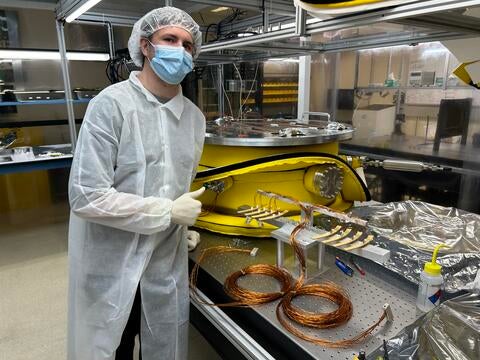Aiden Wilkin, a fourth-year undergraduate student at UCR, has received a $3,000 fellowship made possible by a donation to the Department of Physics and Astronomy. The fellowship will support Wilkin’s research with Jonathan Richardson, an assistant professor of physics and astronomy, helping him to continue working with the Laser Interferometer Gravitational-wave Observatory, or LIGO, experimental group at UCR.
Based at sites in Louisiana and Washington, LIGO was completed in 2002. It detects gravitational waves — ripples in space that travel at the speed of light — generated by the collisions of distant black holes and neutron stars.
“The research this fellowship supports is the development of new optical devices to be used in gravitational wave detection,” said Wilkin, who plans to graduate this spring with a bachelor’s degree in physics. “This is exciting as it will allow us to know much more about the cosmos and its largest events. We will be able to understand what really happens when two black holes collide with each other.”
After he graduates from UCR, Wilkin plans to attend graduate school and get his doctoral degree in physics. He was “Outstanding Physics Student” in his first, second, and third years of undergraduate studies.
“In the nearly three years that Aiden has been working with me, he has distinguished himself as an outstanding experimental researcher,” Richardson said. “My lab is developing new optical technology aimed at expanding the volume of the universe observable with gravitational waves. Aiden has made central contributions to this effort whose depth and breadth are unusual for an undergraduate.”
Richardson explained that currently his lab is designing and prototyping new adaptive optical devices for better laser wavefront control in LIGO, targeting a main factor that limits LIGO’s sensitivity to astrophysical events in the distant universe.
“Aiden has played a key role in every phase of the development of our first full-scale prototype for LIGO’s massive 40-kg mirrors, from design, to fabrication, to experimental testing in our lab,” Richardson said. “These varied experiences have given him a broad experimental training that I am confident will enable him to excel in a physics doctoral degree program.”
UCR alumnus Ron Bieniek made the donation to the Department of Physics and Astronomy, with no restrictions on how the money is used by the fellowship recipient.
“From my mentoring of STEM students, I know how important it is for them to establish a research-desire/accomplishment track record to launch their careers – particularly if it is to a top-tier graduate program,” said Bieniek, who graduated from UCR in 1970 with a bachelor's in physics.
Bieniek received his master’s degree in history of science and doctoral degree in physics from Harvard University, doing research at its Center for Astrophysics. His area of scientific research expertise is atomic and molecular collision theory. He is now professor emeritus of physics at Missouri University of Science and Technology and professor emeritus of mechanical engineering at Marshall University in West Virginia, where he currently resides.
